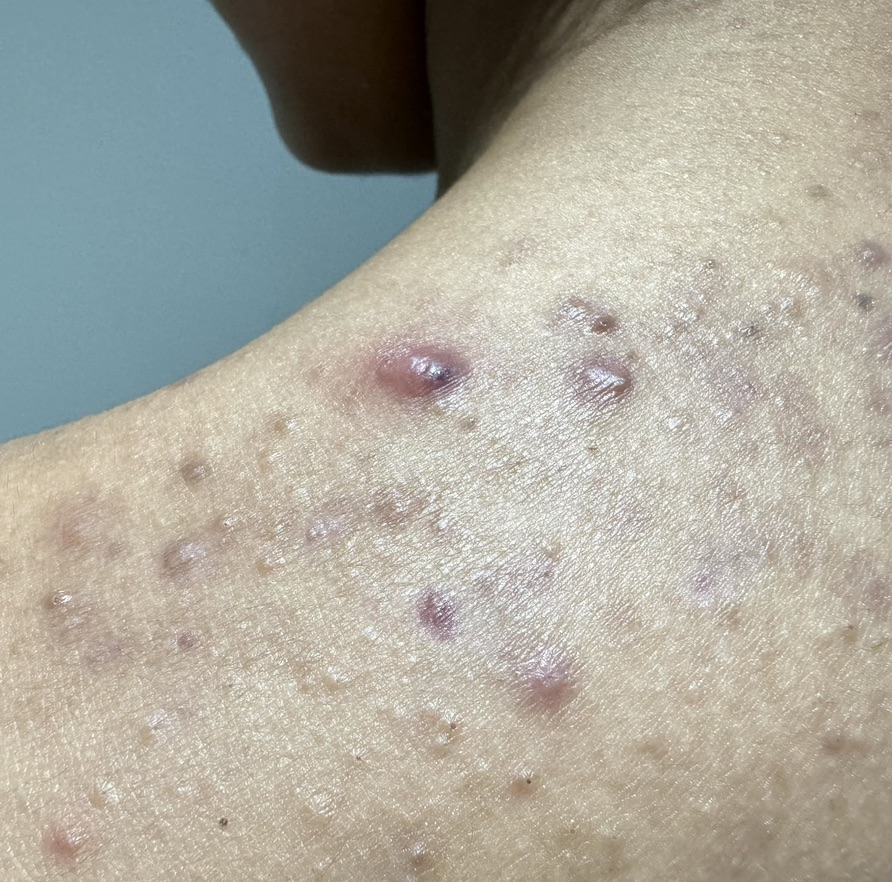Does diet cause acne?
Acne Explained
What is acne?
Acne is one of the most common skin conditions, typically affecting teenagers but sometimes continuing into adulthood or even developing for the first time later in life. It can range from mild blackheads and whiteheads to more severe, inflamed spots and cysts that may cause scarring if left untreated.

What causes acne?
Acne develops when the tiny grease (sebaceous) glands attached to hair follicles become blocked. These glands normally produce sebum, a natural oil that helps keep the skin and hair moisturised. When the flow of sebum is blocked, it builds up inside the gland, leading to different types of spots.
Several factors can contribute to acne:
Hormones
Hormonal changes, particularly during puberty, increase the production of sebum, making acne more likely.
Genetics
Acne can run in families, and ongoing studies suggest that some people may inherit a tendency to develop it.
Blockages and inflammation
When pores become blocked, small white bumps may appear under the skin (closed comedones). If the blockage opens to the surface, it forms a blackhead (open comedone). When inflammation occurs, red or white spots (pustules) develop. In more severe cases, these can progress into painful lumps and cysts (nodulocystic acne).
How is acne treated?
Diet is often blamed for acne, but research shows that it plays little or no role in most cases.
Acne-prone skin is usually felt to be greasy but is actually dry, and many treatments can cause further dryness. Using an oil-free moisturiser can help balance this. Oil-free makeup can also be safely used on acne-prone skin.
Treatment depends on the severity of your acne and how your skin responds. Dr Flann offers a full range of evidence-based options, including:
Topical treatments (creams, gels, and lotions)
These reduce blocked pores and inflammation. They often cause redness or mild irritation at first, which usually improves with continued use.
Antibiotic tablets
Specific antibiotics for acne can reduce inflammation and bacterial growth. They are typically taken for 4–6 months, often alongside a topical treatment.
Hyfrecation of macrocomedones
A minor procedure performed by your consultant dermatologist to unblock larger clogged pores, helping stop the acne process from progressing further.
Isotretinoin (oral vitamin A)
A highly effective prescription medication used for severe or persistent acne that has not responded to other treatments. It is available only under the supervision of a consultant dermatologist.
Important information about isotretinoin
Isotretinoin can cause significant side effects and requires careful monitoring, including blood tests. It must never be taken during pregnancy, as it can cause severe harm to an unborn baby. Women of childbearing age must use two reliable forms of contraception and have regular pregnancy testing during and for one month after treatment.
In the UK, anyone who is being considered for isotretinoin will need to be counselled about it, watch a Patient Information Video (available from the BAD or via my secretary)and sign a 2-page Acknowledgement of Risk form.